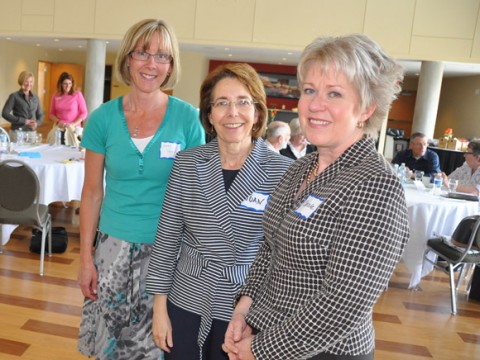
Researchers from UBC’s Okanagan campus are working with hospice societies from throughout B.C.’s Southern Interior. The team includes, from left, Barb Pesut, Assistant Professor of Nursing, Joan Bottorff, Director of the Institute for Healthy Living and Chronic Disease Prevention, and Carole Robinson, Acting Director of the School of Nursing.
A research team at UBC’s Okanagan campus is working with hospice palliative care societies from throughout the B.C. Interior to help improve end-of-life care for people in rural and remote communities.
Executive directors from 24 of the region’s volunteer hospice societies were invited to meet at UBC’s Okanagan campus on April 22 to share their experiences with one another and with researchers.
“We want to understand their challenges, the programs they offer, innovative ideas they have, and to build stronger links with the university so we can engage in a program of research,” says researcher Barb Pesut, Assistant Professor of Nursing. “We want to find out what the key questions should be — and work together to answer those questions.”
The meeting in April shared a sense of purpose with this week’s National Hospice Palliative Care Week, May 2 to 8: to bring a focus on people living with life-limiting illness, their caregivers and family members, providing a venue to share their experiences and the importance of what hospice and palliative care means to them.
“End-of-life care is the kind of service everyone needs and deserves — the right to die with dignity — and hospice societies provide that and do it well,” says Kate McDonough, a member of the project team and Executive Director of the Williams Lake Hospice Palliative Care Society.
Palliative care is far more than the care that happens at end of life, says researcher Carole Robinson, Acting Director of the School of Nursing.
“It includes all the care aimed at enhancing quality of life when someone has life-shortening illness,” Robinson says. “We are turning our attention to the family caregivers who provide so much of this care and who are at risk of compromising their own health, with the intent of developing effective supports.”
The project is funded by a $15,000 internal grant from UBC and will continue with a more in-depth exploration of the experiences of people in rural or remote communities. The team is now seeking family members who, during the past two years, have provided care for a loved one at the end of life, and who are willing to be interviewed by phone. Anyone interested in participating is encouraged to contact the research team at 1-877-806-9955 or email barb.pesut@ubc.ca for more information.
“Engaging community members in our research is exactly what we are aiming for here at UBC Okanagan,” says Joan Bottorff, Director of the Institute for Healthy Living and Chronic Disease Prevention. “They bring a wealth of local experience to our discussions — and that is key to helping us identify priorities for palliative care research that will make a real difference to families.”
This project is part of a larger research program exploring ethics in rural palliative care, which has received $148,000 from the Canadian Institutes of Health Research. That three-year initiative includes an ethnographic study of rural communities in B.C., and is now in its second year.
— 30 —